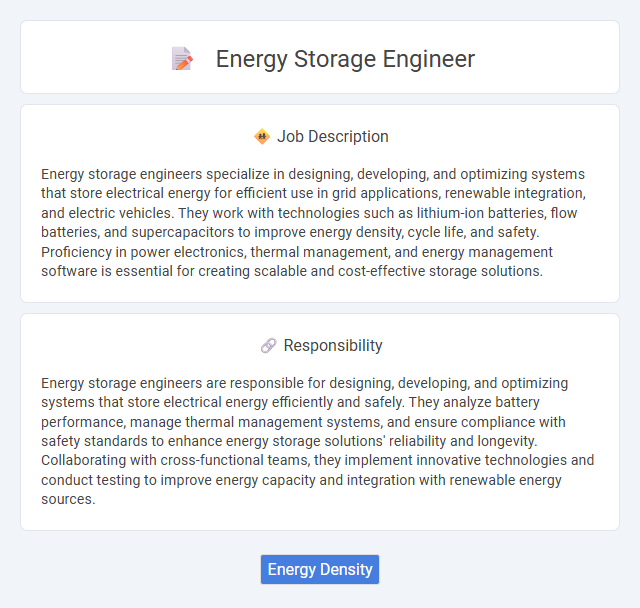
Energy storage engineers specialize in designing, developing, and optimizing systems that store electrical energy for efficient use in grid applications, renewable integration, and electric vehicles. They work with technologies such as lithium-ion batteries, flow batteries, and supercapacitors to improve energy density, cycle life, and safety. Proficiency in power electronics, thermal management, and energy management software is essential for creating scalable and cost-effective storage solutions.
Individuals with strong analytical skills and a background in electrical or mechanical engineering are likely to excel as energy storage engineers. Those who are comfortable working with complex systems and have a keen interest in sustainable technologies may find this role particularly suitable. Candidates who thrive in collaborative environments and can adapt to evolving energy storage innovations are probably well-suited for this position.
Qualification
Energy storage engineers must possess a strong background in electrical or mechanical engineering, often demonstrated by a bachelor's or master's degree in these fields. Proficiency in battery technologies, power systems, and energy management software is crucial for designing efficient storage solutions. Experience with simulation tools, project management skills, and knowledge of safety standards further enhance qualifications for this role.
Responsibility
Energy storage engineers are responsible for designing, developing, and optimizing systems that store electrical energy efficiently and safely. They analyze battery performance, manage thermal management systems, and ensure compliance with safety standards to enhance energy storage solutions' reliability and longevity. Collaborating with cross-functional teams, they implement innovative technologies and conduct testing to improve energy capacity and integration with renewable energy sources.
Benefit
Energy storage engineers likely contribute significantly to enhancing renewable energy integration, leading to more stable and efficient power systems. They probably enjoy benefits such as competitive salaries, opportunities for innovation in cutting-edge technologies, and career growth in the rapidly expanding clean energy sector. Job roles may also offer the chance to work on impactful projects that reduce carbon footprints, potentially providing personal and professional fulfillment.
Challenge
Energy storage engineer roles likely involve solving complex technical challenges related to battery efficiency, longevity, and safety. Potential difficulties may include designing scalable systems that integrate seamlessly with renewable energy sources under variable conditions. These challenges require innovative problem-solving skills and continuous adaptation to evolving technologies.
Career Advancement
Energy storage engineers specialize in designing and optimizing systems that store electrical energy for efficient use in renewable and grid applications, making them critical in the transition to sustainable energy. Career advancement often involves gaining expertise in battery technologies, grid integration, and power electronics, combined with project management and regulatory knowledge. Professionals can progress to senior engineering roles, R&D leadership positions, or strategic roles in energy storage consultancy and innovation.
Key Terms
Energy Density
Energy storage engineers specialize in optimizing energy density to enhance the capacity and efficiency of batteries and other storage systems. They develop advanced materials and technologies that maximize energy density, enabling longer-lasting and more compact energy storage solutions. Their work is crucial for applications in electric vehicles, renewable energy integration, and grid stabilization.
 kuljobs.com
kuljobs.com